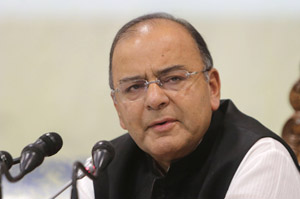New Delhi, Nov 22: Faced with the daunting task of getting back black money stashed abroad, government on Saturday said it was having a relook at some of the bilateral tax treaties signed with foreign countries that may be hindering the repatriation of the money.
"Of course, we are," finance minister Arun Jaitley said.
He was asked whether the government would have a relook at the bilateral treaties through which the government was not easily getting information about black money hoarders abroad.
Jaitley said he had sent a delegation recently to Switzerland and they have come back with some positive movement.
"We have to furnish evidence independent of the HSBC list. I can't go to them (foreign countries) and they say the HSBC list is stolen, I won't cooperate. So I won't go to you on the basis of stolen list. But if I present to you some independent evidence about names which happen to come on the stolen list, then will you provide me the evidence?," he said referring to the discussions with Swiss government.
Asked if this was not provided in the current bilateral treaties, the minister said: "This is what we have discussed. Increasingly the cooperation is increasing. Now if you see the US laws, they want more and more countries to accept that law which provides for automatic exchange of information."
To a question whether India would be signing such a treaty, the minister said, "our application is precisely that. The Supreme Court, the earlier judgment, needs a clarification. So the special investigation team (SIT) is looking into it."
On another question relating to difficulties in getting black money from abroad, a promise of which was made by BJP during elections, Jaitley said there is a settled procedure and government has to go by that settled process.
"The world today is uniting to unearth these unauthorised transactions. Conventionally they were against crime money and not tax evaded money.
"Today even tax evaded money, which flies from one part of the world to another, there is exchange of information. And then if you are able to prove that it's contrary to law they give you the supporting evidence. You have to go through that procedure. There is no other short cut," he said.
The minister parried a question about the possibility of an amnesty scheme to unearth black money, both within and outside the country.
"Every institution in this matter has to realise its responsibilities," he said without elaborating.
To a question on the Congress criticism of the relaunching of the Kisan Vikas Patra (KVP) in which even narco terrorism money can be laundered, Jaitley dismissed such fears saying there are adequate safeguards built in it.
He said the Congress gave its reaction without reading the notification on the KVP scheme and there cannot be a debate on "ill-informed or semi-informed facts".
"In the notification we have said that the moment you buy those patras you have to give name and address. So the KYC norms are there and if you are buying more than Rs 50,000 then you have to give your PAN card.
"So the argument is narcotic dealers and narco terrorism and all those people will buy. But then they have to give their PAN cards and we will arrest all of them. You can't have a debate on ill-informed or semi-informed facts."





Comments
Add new comment